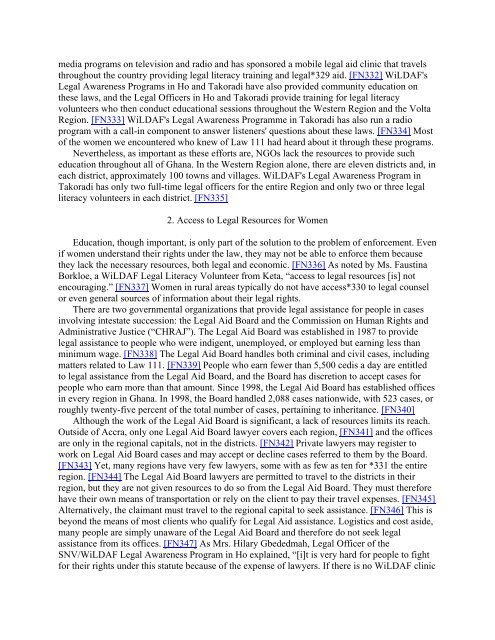Law, Culture and Women's Inheritance Rights in ... - Leitner Center
Law, Culture and Women's Inheritance Rights in ... - Leitner Center
Law, Culture and Women's Inheritance Rights in ... - Leitner Center
Create successful ePaper yourself
Turn your PDF publications into a flip-book with our unique Google optimized e-Paper software.
media programs on television <strong>and</strong> radio <strong>and</strong> has sponsored a mobile legal aid cl<strong>in</strong>ic that travels<br />
throughout the country provid<strong>in</strong>g legal literacy tra<strong>in</strong><strong>in</strong>g <strong>and</strong> legal*329 aid. [FN332] WiLDAF's<br />
Legal Awareness Programs <strong>in</strong> Ho <strong>and</strong> Takoradi have also provided community education on<br />
these laws, <strong>and</strong> the Legal Officers <strong>in</strong> Ho <strong>and</strong> Takoradi provide tra<strong>in</strong><strong>in</strong>g for legal literacy<br />
volunteers who then conduct educational sessions throughout the Western Region <strong>and</strong> the Volta<br />
Region. [FN333] WiLDAF's Legal Awareness Programme <strong>in</strong> Takoradi has also run a radio<br />
program with a call-<strong>in</strong> component to answer listeners' questions about these laws. [FN334] Most<br />
of the women we encountered who knew of <strong>Law</strong> 111 had heard about it through these programs.<br />
Nevertheless, as important as these efforts are, NGOs lack the resources to provide such<br />
education throughout all of Ghana. In the Western Region alone, there are eleven districts <strong>and</strong>, <strong>in</strong><br />
each district, approximately 100 towns <strong>and</strong> villages. WiLDAF's Legal Awareness Program <strong>in</strong><br />
Takoradi has only two full-time legal officers for the entire Region <strong>and</strong> only two or three legal<br />
literacy volunteers <strong>in</strong> each district. [FN335]<br />
2. Access to Legal Resources for Women<br />
Education, though important, is only part of the solution to the problem of enforcement. Even<br />
if women underst<strong>and</strong> their rights under the law, they may not be able to enforce them because<br />
they lack the necessary resources, both legal <strong>and</strong> economic. [FN336] As noted by Ms. Faust<strong>in</strong>a<br />
Borkloe, a WiLDAF Legal Literacy Volunteer from Keta, “access to legal resources [is] not<br />
encourag<strong>in</strong>g.” [FN337] Women <strong>in</strong> rural areas typically do not have access*330 to legal counsel<br />
or even general sources of <strong>in</strong>formation about their legal rights.<br />
There are two governmental organizations that provide legal assistance for people <strong>in</strong> cases<br />
<strong>in</strong>volv<strong>in</strong>g <strong>in</strong>testate succession: the Legal Aid Board <strong>and</strong> the Commission on Human <strong>Rights</strong> <strong>and</strong><br />
Adm<strong>in</strong>istrative Justice (“CHRAJ”). The Legal Aid Board was established <strong>in</strong> 1987 to provide<br />
legal assistance to people who were <strong>in</strong>digent, unemployed, or employed but earn<strong>in</strong>g less than<br />
m<strong>in</strong>imum wage. [FN338] The Legal Aid Board h<strong>and</strong>les both crim<strong>in</strong>al <strong>and</strong> civil cases, <strong>in</strong>clud<strong>in</strong>g<br />
matters related to <strong>Law</strong> 111. [FN339] People who earn fewer than 5,500 cedis a day are entitled<br />
to legal assistance from the Legal Aid Board, <strong>and</strong> the Board has discretion to accept cases for<br />
people who earn more than that amount. S<strong>in</strong>ce 1998, the Legal Aid Board has established offices<br />
<strong>in</strong> every region <strong>in</strong> Ghana. In 1998, the Board h<strong>and</strong>led 2,088 cases nationwide, with 523 cases, or<br />
roughly twenty-five percent of the total number of cases, perta<strong>in</strong><strong>in</strong>g to <strong>in</strong>heritance. [FN340]<br />
Although the work of the Legal Aid Board is significant, a lack of resources limits its reach.<br />
Outside of Accra, only one Legal Aid Board lawyer covers each region, [FN341] <strong>and</strong> the offices<br />
are only <strong>in</strong> the regional capitals, not <strong>in</strong> the districts. [FN342] Private lawyers may register to<br />
work on Legal Aid Board cases <strong>and</strong> may accept or decl<strong>in</strong>e cases referred to them by the Board.<br />
[FN343] Yet, many regions have very few lawyers, some with as few as ten for *331 the entire<br />
region. [FN344] The Legal Aid Board lawyers are permitted to travel to the districts <strong>in</strong> their<br />
region, but they are not given resources to do so from the Legal Aid Board. They must therefore<br />
have their own means of transportation or rely on the client to pay their travel expenses. [FN345]<br />
Alternatively, the claimant must travel to the regional capital to seek assistance. [FN346] This is<br />
beyond the means of most clients who qualify for Legal Aid assistance. Logistics <strong>and</strong> cost aside,<br />
many people are simply unaware of the Legal Aid Board <strong>and</strong> therefore do not seek legal<br />
assistance from its offices. [FN347] As Mrs. Hilary Gbededmah, Legal Officer of the<br />
SNV/WiLDAF Legal Awareness Program <strong>in</strong> Ho expla<strong>in</strong>ed, “[i]t is very hard for people to fight<br />
for their rights under this statute because of the expense of lawyers. If there is no WiLDAF cl<strong>in</strong>ic


